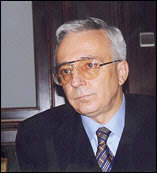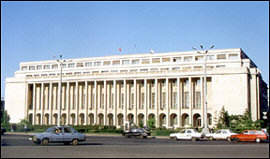 MACROECONOMICS MACROECONOMICS |

Mr. Mugur Isarescu, an intelligent man loved by the media for its strong will and sense of humor was most likely chosen as the new Prime Minister because he is considered an economic maverick. Despite insistent calls by international rating agencies that Romania was going to default, "Romania has managed, against all odds, to fulfill its international obligations. We serviced our debt" claims Mr. Isarescu. As Governor of the National Bank he was closely working with the Government in the sharp economic adjustments needed to comply with the IMF, the World Bank and EU requirements. The adjustment program was endorsed by the WB and supported by a 10 month agreement with the IMF. Contingency measures center mostly on the monetary and exchange rate policies.
Inflation run between 50-55% in 1999. Although it had been forecasted at 32%, it was a considerable reduction from the 1998 rate of 130%. However "the main target for 1999 was not inflation, but rather the adjustment of the current account deficit, something that we fully accomplished" explains Mr. Isarescu. Inflation still remains to be mastered, and the forecast for 2000 is a rather optimistic figure: 25-35%. As the Prime Minister put it: "being the year 2000 an electoral year [ general elections will take place in October] it will be very hard to have a tight reform and to take hard decisions such as the close down of large non-performing companies".
 | Instead, Mr Isarescu counts on lowering the inflation through four major venues. Firstly by keeping track of the restructure reforms already in place -streamlining the civil service, reducing the number of State Agencies, cutting down government spending, etc. Secondly through an increase of foreign finance which has already started dripping in from EU funding. For the year 2000 the European Commission granted Romania 650 million Euro. Thirdly, a tighter control and consistency in the policy mix: monetary, fiscal and income policies will be necessary. And finally, especially in an election year, political stability will be a must. Mr. Isarescu is aware that "the fact that we are a young democracy but with Latin blood, with Balcanic habits and a Communist inheritance could create conflicts. If foreign investors perceive the country as politically unstable, then there would not be any predictability regarding capital influx and the business climate could be seriously hurt" concludes the Prime Minister.

However fears that the country will default seem groundless. In 1999 public and publicly guaranteed debt service met on time without official assistance, out of domestic reserves. Presently the Debt does not represent more than 30% of the GDP. And in 2000 the expected foreign debt service will be 45% lower than in 1999. Romania is the only transition economy in Eastern Europe to have substantially reduced the stock of Medium and Long Term foreign debt in a year with a considerable external adjustment and reserve build up. The country successfully rebuilt its foreign exchange and gold reserves which today amount to over US$ 2.5 billion, commercial banks holding an extra US$ 1-1.5 billion. |

